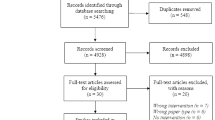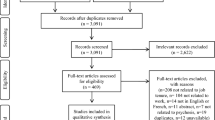Abstract
Purpose To explore and synthesize the views of Supported Employment clients, employment specialists and their supervisors on the core contributions of employment specialists to job support within the mental health field. Methods We systematically searched four databases with no time limitations and identified 16 qualitative studies published between 2006 and 2018 to be included in this meta-ethnographic study. Results The overarching metaphor of “Navigating an Unpredictable Iceberg-laden Sea” (a workplace) and seven themes were revealed: (1) “It’s you and me looking,” which represented the relationship between the client and ES, and (2) taking job seekers’ ambitions and needs seriously, (3) mapping the route, (4) exploring the hidden, (5) being on tap, (6) avoiding crashes, and (7) bridging, which embodied the work of employments specialists. Conclusion. Our iceberg metaphor illustrates the importance of employment specialists being competent in addressing clients’ work performance difficulties related not only to the individual’s illness, age, gender, and cultural-related challenges, but also to psychosocial, behavioral, and environmental workplace factors. Given the effects of the specific characteristics of the working alliance developed in supported employment, we suggest that employment specialists’ training and supervision be enriched by paying more attention to these important relational processes.
Similar content being viewed by others
References
OECD: Sick on the job?: myths and realities about mental health and work. https://www.oecd.org/els/mental-health-and-work-9789264124523-en.htm (2012). Accessed Nov 2011.
Mueser KT, McGurk SR. Supported employment for persons with serious mental illness: current status and future directions. Encephale. 2014;40(Suppl 2):S45-56. https://doi.org/10.1016/j.encep.2014.04.008.
Jonsdottir A, Waghorn G. Psychiatric disorders and labour force activity. Ment Health Rev J. 2015;20(1):13–27. https://doi.org/10.1108/Mhrj-05-2014-0018.
Vázquez-Estupiñán MF, Durand-Arias S, Astudillo-García CI, Madrigal de León EÁ. Effectiveness of augmented individual placement and support interventions for competitive employment in people with schizophrenia: systematic review and meta-analysis. Salud Mental. 2018;41(4):187–197. https://doi.org/10.17711/SM.0185-3325.2018.027.
Bond GR, Drake RE. Predictors of competitive employment among patients with schizophrenia. Curr Opin Psychiatry. 2008;21:362–369. https://doi.org/10.1097/YCO.0b013e328300eb0e.
Tsang HW, Leung AY, Chung RC, Bell M, Cheung W. Review on vocational predictors: a systematic review of predictors of vocational outcomes among individuals with schizophrenia: an update since 1998. Aust N Z J Psychiatry. 2010;44(6):495–504.
Catty J, Lissouba P, White S, Becker T, Drake RE, Fioritti A, et al. Predictors of employment for people with severe mental illness: results of an international six-centre randomised controlled trial. Br J Psychiatry . 2008;192:224–231. https://doi.org/10.1192/bjp.bp.107.041475.
Charette-Dussault E, Corbiere M. An integrative review of the barriers to job acquisition for people with severe mental illnesses. J Nerv Ment Dis. 2019;207(7):523–537. https://doi.org/10.1097/NMD.0000000000001013.
Williams AE, Fossey E, Corbiere M, Paluch T, Harvey C. Work participation for people with severe mental illnesses: an integrative review of factors impacting job tenure. Aust Occup Ther J. 2016;63(2):65–85. https://doi.org/10.1111/1440-1630.12237.
Fossey E, Harvey C. Finding and sustaining employment: a qualitative meta-synthesis of mental health consumer views. Can J Occup Ther. 2010:303–314. https://doi.org/10.2182/cjot.2010.77.5.6.
Kinn LG, Holgersen H, Aas RW, Davidson L. “Balancing on skates on the icy surface of work”: a metasynthesis of work participation for persons with psychiatric disabilities. J Occup Rehabil. 2014;24(1):125–138. https://doi.org/10.1007/s10926-013-9445-x.
Corbiere M, Charette-Dussault É, Villotti P. Factors of competitive employment for people with severe mental illness, from acquisition to tenure. In: Bültmann U, Siegrist J, editors. Handbook of disability, work and health. Cham: Springer International Publishing; 2020. p. 1–26.
Lexén A, Emmelin M, Bejerholm U. Individual placement and support is the keyhole employer experiences of supporting persons with mental illness. J Vocat Rehabil. 2016;44(2):135–147. https://doi.org/10.3233/JVR-150786.
Drake RE, Bond GR. IPS support employment: a 20-year update. Am J Psychiatr Rehabil. 2011;14(3):155–164. https://doi.org/10.1080/15487768.2011.598090.
Drake RE, Bond GR, Goldman HH, Hogan MF, Karakus M. Individual placement and support services boost employment for people with serious mental illnesses, but funding is lacking. Health Aff. 2016;35(6):1098–1105. https://doi.org/10.1377/hlthaff.2016.0001.
Corbiere M, Villotti P, Lecomte T, Bond GR, Lesage A, Goldner EM. Work accommodations and natural supports for maintaining employment. Psychiatr Rehabil J. 2014;37(2):90–98. https://doi.org/10.1037/prj0000033.
Mueser KT, Drake RE, Bond GR. Recent advances in supported employment for people with serious mental illness. Curr Opin Psychiatry. 2016;29(3):196–201. https://doi.org/10.1097/YCO.0000000000000247.
Bejerholm U, Larsson L, Hofgren C. Individual placement and support illustrated in the Swedish welfare system: a case study. J Vocat Rehabil. 2011:59–72. https://doi.org/10.3233/JVR-2011-0554.
Luciano A, Drake RE, Bond GR, Becker DR, Carpenter-Song E, Lord S, et al. Evidence-based supported employment for people with severe mental illness: past, current, and future research. J Vocat Rehabil. 2014;40(1):1–13. https://doi.org/10.3233/JVR-130666.
Scanlan JN, Feder K, Ennals P, Hancock N. Outcomes of an individual placement and support programme incorporating principles of the collaborative recovery model. Aust Occup Ther J. 2019;66(4):519–529. https://doi.org/10.1111/1440-1630.12580.
Modini M, Tan L, Brinchmann B, Wang MJ, Killackey E, Glozier N, et al. Supported employment for people with severe mental illness: systematic review and meta-analysis of the international evidence. Br J Psychiatry. 2016;209(1):14–22. https://doi.org/10.1192/bjp.bp.115.165092.
Bond GR, Kukla M. Impact of follow-along support on job tenure in the individual placement and support model. J Nerv Ment Dis. 2011;199:150–155. https://doi.org/10.1097/NMD.0b013e31820c752f.
McDowell C, Fossey E. Workplace accommodations for people with mental illness: a scoping review. J Occup Rehabil. 2015;25:197–206. https://doi.org/10.1007/s10926-014-9512-y.
McGurk SR, Wykes T. Cognitive remediation and vocational rehabilitation. Psychiatr Rehabil J. 2008;31(4):350–359. https://doi.org/10.2975/31.4.2008.350.359.
Drake RE, Bond GR, Rapp C. Explaining the variance within supported employment programs: comment on “what predicts supported employment outcomes?” Community Ment Health J. 2006;42(3):315–318. https://doi.org/10.1007/s10597-006-9038-7.
Corbiere M, Lecomte T, Reinharz D, Kirsh B, Goering P, Menear M, et al. Predictors of acquisition of competitive employment for people enrolled in supported employment programs. J Nerv Ment Dis. 2017;205(4):275–282. https://doi.org/10.1097/NMD.0000000000000612.
Corbiere M, Brouwers E, Lanctot N, van Weeghel J. Employment specialist competencies for supported employment programs. J Occup Rehabil. 2014;24(3):484–497. https://doi.org/10.1007/s10926-013-9482-5.
Teixeira C, Rogers ES, Russinova Z, Lord EM. Defining employment specialist competencies: results of a participatory research study. Community Ment Health J. 2020;56(3):440–447. https://doi.org/10.1007/s10597-019-00497-3.
Taylor A, Bond GR. Employment specialist competencies as predictors of employment outcomes. Community Ment Hlt J. 2014;50(1):31–40. https://doi.org/10.1007/s10597-012-9554-6.
Noblit GW, Hare RD. Meta-ethnography: synthesizing qualitative studies. Newbury Park, CA: Sage Publications; 1988.
France EF, Cunningham M, Ring N, Uny I, Duncan EA, Jepson RG, et al. Improving reporting of meta-ethnography: the eMERGe reporting guidance. J Adv Nurs. 2019;75(5):1126–1139. https://doi.org/10.1111/jan.13809.
Zimmer L. Qualitative meta-synthesis: a question of dialoguing with texts. J Adv Nurs. 2006;53:311–318. https://doi.org/10.1111/j.1365-2648.2006.03721.x.
France EF, Uny I, Ring N, Turley RL, Maxwell M, Duncan EAS, et al. A methodological systematic review of meta-ethnography conduct to articulate the complex analytical phases. BMC Med Res Methodol. 2019;19(1):35. https://doi.org/10.1186/s12874-019-0670-7.
Kinn LG, Holgersen H, Ekeland TJ, Davidson L. Meta-synthesis and Bricolage: an artistic exercise of creating a collage of meaning. Qual Health Res. 2013;23(9):1285–1292. https://doi.org/10.1177/1049732313502127.
Murray C, Stanley M. Meta-synthesis demystified. Connecting islands of knowledge. In: Nayar S, Stanley M, editors. Qualitative research methodologies for occupational science and therapy. 1st ed. New York: Routledge; 2015. p. 174–190.
Whittemore R, Knafl K. The integrative review: updated methodology. J Adv Nurs. 2005;52(5):546–553. https://doi.org/10.1111/j.1365-2648.2005.03621.x.
Cooke A, Smith D, Booth A. Beyond PICO: the SPIDER tool for qualitative evidence synthesis. Qual Health Res. 2012;22(10):1435–1443. https://doi.org/10.1177/1049732312452938.
Stige B, Malterud K, Midtgarden T. Toward an agenda for evaluation of qualitative research. Qual Health Res. 2009;19:1504–1516. https://doi.org/10.1177/1049732309348501.
Campbell R, Pound P, Pope C, Britten N, Pill R, Morgan M, et al. Evaluating meta-ethnography: a synthesis of qualitative research on lay experiences of diabetes and diabetes care. Soc Sci Med. 2003;56(4):671–684. https://doi.org/10.1016/s0277-9536(02)00064-3.
Poremski D, Woodhall-Melnik J, Lemieux AJ, Stergiopoulos V. Persisting barriers to employment for recently housed adults with mental illness who were homeless. J Urban Health. 2016;93(1):96–108. https://doi.org/10.1007/s11524-015-0012-y.
Areberg C, Bjorkman T, Bejerholm U. Experiences of the individual placement and support approach in persons with severe mental illness. Scand J Caring Sci. 2013;27(3):589–596. https://doi.org/10.1111/j.1471-6712.2012.01056.x.
Poremski D, Whitley R, Latimer E. Building trust with people receiving supported employment and housing first services. Psychiatr Rehabil J. 2016;39(1):20–26. https://doi.org/10.1037/prj0000137.
Gammelgaard I, Christensen TN, Eplov LF, Jensen SB, Stenager E, Petersen KS. ‘I have potential’: experiences of recovery in the individual placement and support intervention. Int J Soc Psychiatr. 2017;63(5):400–406. https://doi.org/10.1177/0020764017708801.
Boycott N, Akhtar A, Schneider J. «Work is good for me": views of mental health service users seeking work during the UK recession, a qualitative analysis. J Ment Health. 2015;24(2):93–97. https://doi.org/10.3109/09638237.2015.1019044.
Topor A, Ljungberg A. “Everything is so relaxed and personal”–the construction of helpful relationships in individual placement and support. Am J Psychiatr Rehabil. 2016;19(4):275–293. https://doi.org/10.1080/15487768.2016.1255276.
Coombes K, Haracz K, Robson E, James C. Pushing through: mental health consumers’ experiences of an individual placement and support employment programme. Br J Occup Ther. 2016;79(11):651–659. https://doi.org/10.1177/0308022616658297.
Johanson S, Markström U, Bejerholm U. Enabling the return-to-work process among people with affective disorders: a multiple-case study. Scand J Occup Ther. 2017;26(3):205–218. https://doi.org/10.1080/11038128.2017.1396356.
Kostick KM, Whitley R, Bush PW. Client-centeredness in supported employment: specialist and supervisor perspectives. J Ment Health. 2010;19(6):523–531. https://doi.org/10.3109/09638237.2010.520364.
Lidz CW, Smith LM. Employment specialists’ perspectives on implementing supported employment with young adults. Am J Psychiatr Rehabil. 2016;19(4):339–352. https://doi.org/10.1080/15487768.2016.1231640.
Whitley R, Kostick KM, Bush PW. Desirable characteristics and competencies of supported employment specialists: an empirically-grounded framework. Adm Policy Ment Health. 2010;37(6):509–519. https://doi.org/10.1007/s10488-010-0297-9.
Glover CM, Frounfelker RL. Competencies of employment specialists for effective job development. Am J Psychiatr Rehabil. 2011;14(3):198–211. https://doi.org/10.1080/15487768.2011.598093.
Glover CM, Frounfelker RL. Competencies of more and less successful employment specialists. Community Ment Health J. 2013;49(3):311–316. https://doi.org/10.1007/s10597-011-9471-0.
King J, Waghorn G. How higher performing employment specialists support job-seekers with psychiatric disabilities retain employment. J Rehabil. 2018a;84(4):22–28.
King J, Waghorn G. How higher performing employment specialists engage and support job-seekers with psychiatric disabilities. J Rehabil. 2018b;84(2):48–56.
Whitley R, Kostick KM, Bush PW. Supported employment specialist strategies to assist clients with severe mental illness and criminal justice issues. Psychiatr Serv. 2009;60:1637–1641. https://doi.org/10.1176/appi.ps.60.12.1637.
Weaver GR. Understanding and coping with cross-cultural adjustment stress. In: Paige RM, editor. Cross- cultural orientation, new conceptualizations and applications. Lanham, MD: University Press of America; 1986.
Blitz CL, Mechanic D. Facilitators and barriers to employment among individuals with psychiatric disabilities: a job coach perspective. Work. 2006;26(4):407–419.
Cronin S, Curran J, Lantorno J, Murphy K, Shaw L, Boutcher N, et al. Work capacity assessment and return to work: a scoping review. Work. 2013;44(1):37–55. https://doi.org/10.3233/WOR-2012-01560.
Law M, Cooper B, Strong S, Stewart D, Ring By P, Lett L. The person-environment-occupation model: a transactive approach to occupational performance. CJOT. 1996;63(1):9–23.
Lexen A, Hofgren C, Bejerholm U. Support and process in individual placement and support: a multiple case study. Work. 2013;44(4):435–448. https://doi.org/10.3233/WOR-2012-1360.
Davidson L, Chan KK. Common factors: evidence-based practice and recovery. Am Psychiatric Assoc. 2014.
Wampold BE. Contextualizing psychotherapy as a healing practice: Culture, history, and methods. Appl Prev Psychol. 2001;10(2):69–86.
Doroud N, Fossey E, Fortune T. Recovery as an occupational journey: a scoping review exploring the links between occupational engagement and recovery for people with enduring mental health issues. Aust Occup Ther J. 2015;62(6):378–392. https://doi.org/10.1111/1440-1630.12238.
Finlay L. A Dance between the reduction and reflexivity: explicating the “phenomenological psychological attitude.” J Phenomenol Psychol. 2008;39(1):1–32. https://doi.org/10.1163/156916208x311601.
Author information
Authors and Affiliations
Corresponding author
Additional information
Publisher's Note
Springer Nature remains neutral with regard to jurisdictional claims in published maps and institutional affiliations.
Rights and permissions
About this article
Cite this article
Kinn, L.G., Costa, M., Voll, I. et al. “Navigating Between Unpredictable Icebergs”: A Meta-Ethnographic Study of Employment Specialists’ Contributions in Providing Job Support for People with Mental Illness. J Occup Rehabil 31, 512–531 (2021). https://doi.org/10.1007/s10926-020-09943-6
Accepted:
Published:
Issue Date:
DOI: https://doi.org/10.1007/s10926-020-09943-6




